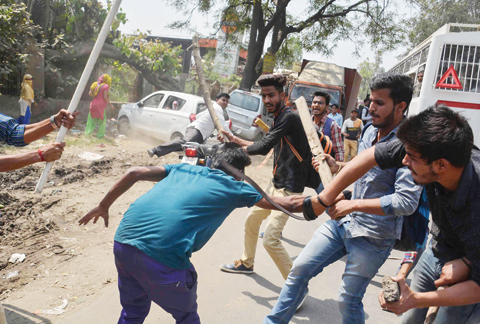
MEERUT, India: A protester (center) is beaten by students after members of the Dalit community and other low-caste groups threw bricks at their college during a countrywide protest yesterday. - AFP
NEW DELHI: Low-caste Dalits fought street battles with police yesterday that left at least seven dead as protests against a Supreme Court rights ruling swept across large swathes of India. Protesters clashed with security forces, attacked buses and government buildings, and blocked trains and major roads. Four were reported dead in the central state of Madhya Pradesh, while three others were killed in other states, local media said.
Madhya Pradesh was the worst hit, but Rishi Kumar Shukla, director general of the state police, told AFP the protests had been brought "under control". A curfew was imposed in parts of Gwalior due to the unrest, Anshuman Yadav, police inspector general for the city, told AFP. There were media reports of more deaths in Morena district of Madhya Pradesh, but police could not immediately confirm fatalities. One death in Uttar Pradesh was in Muzaffarnagar. "Some 30 police and about 30-35 protesters were also injured, one of them seriously," said Praveen Kumar, the state police deputy inspector general.
Rahul Prakash, superintendent of police in Alwar in Rajasthan, said two or three people had been hit by bullets during clashes in the city. Police added that about 20 people had been injured. Trouble was also reported in the capital New Delhi, and Punjab and Bihar states. Television showed police beating protesters and an unidentified person firing shots, with demonstrators in the northern state of Haryana also setting police posts ablaze and attacking shops. The "Bharat Bandh" - or India shutdown - protest was called by groups representing the Dalits, once condemned as the "untouchables", who make up 200 million of India's 1.25 billion population and are at the bottom of the caste hierarchy.
They are angry at a Supreme Court ruling that banned the automatic arrest of the accused in cases under a special law to protect marginalized groups who suffer widespread discrimination. The 1989 Scheduled Castes and Scheduled Tribes (Prevention of Atrocities) Act was intended to guard against the harassment of Dalits and other groups. Dalit leaders say the ruling increases the likelihood of attacks. Dalits are among the most marginalized groups in a country where caste discrimination is outlawed but remains widespread. Last week a young Dalit farmer in Gujarat was beaten to death for owning a horse, which is seen as a symbol of power and wealth.
Across the affected states, groups hurled stones, bottles and burning sticks at police and set buses on fire. Some sat on railway lines to block trains. Reports said a police outpost near Meerut in Uttar Pradesh was set on fire. Authorities in Punjab shut schools and colleges and postponed exams in some affected regions. Media reports said the government had restricted mobile Internet services. Rajnath Singh, India's home minister, called for calm. "The government is appealing against the court order but it is a responsibility of everyone including all political parties to ensure peace," Singh told journalists in Delhi, where the Dalit protests caused traffic chaos.
The discrimination has become a political issue in the run-up to a national election that must be held before May 2019. Rahul Gandhi, head of the opposition Congress party, hit out at the ruling Bharatiya Janata Party of Prime Minister Narendra Modi. "Thousands of Dalit brothers and sisters are demanding the protection of their rights from Modi government on the roads today. We salute them," Gandhi said.
Dalit voters have apparently swayed towards the BJP in recent elections. Observers say this has helped Modi's party take control in several Indian states. "The opposition's nervousness is due to the never before seen nationwide support of backward castes to the Modi government," Arjun Ram Meghwal, a BJP lawmaker and minister in Modi's government, said on Twitter.
"Get out in strong numbers, block the roads if needed, but do not touch public property," Jignesh Mevani, an independent Dalit lawmaker from the western state of Gujarat, told the India Today news channel. Although he backed the protests, Mevani said, he was opposed to any damage to public property. Mayawati Das, former chief minister of Uttar Pradesh and a prominent Dalit politician, also supported the protests while condemning violence. Shops were shut as protesters blocked key roads in many areas, including the capital, New Delhi, and the industrial city of Ahmedabad in Modi's home state of Gujarat, the Times of India newspaper reported. - Agencies









